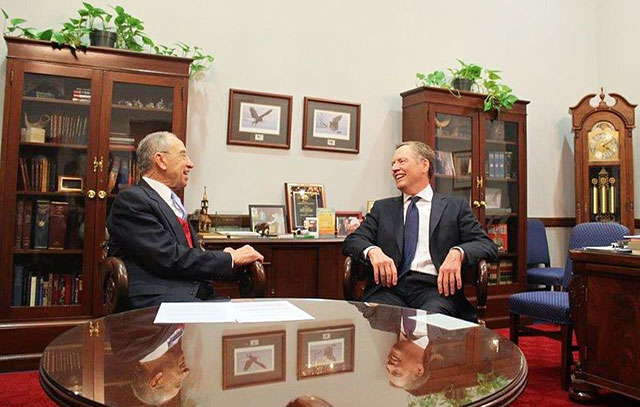
The North American Free Trade Agreement (NAFTA) went into effect at midnight on January 1, 1994. That night, thousands of Indigenous Mayans rose up in arms in the southeastern Mexican state of Chiapas, seizing at least five towns and declaring NAFTA a “death certificate” for people like themselves. This was just the beginning of Mexico’s troubles in a year that brought countless protests, hotly disputed elections and the assassinations of two of the then-ruling party’s leaders. 1994 ended with a sudden devaluation of the peso, the start of an economic collapse from which the country didn’t recover fully for years.
NAFTA is back in the news this month: On August 16, US Trade Representative Robert Lighthizer met with his counterparts from Canada and Mexico, the other two NAFTA nations, to open talks on renegotiating the pact.
While it’s true that NAFTA was just one of the many problems Mexico had in the 1990s, we have to wonder, given the renewed focus on the trade accord, why US mainstream media have carried so little discussion of the events that accompanied NAFTA’s rollout in Mexico. The reason may be a consensus among opinion makers about NAFTA and similar trade pacts.
It is an article of faith across party lines that these accords are beneficial to our trading partners in the Global South. On the right, we have President Trump, who told CBS during the campaign that “Mexico … is taking our jobs. I love the Mexican people. They’re great people. But the leadership is too smart for our country…. We’re being defrauded by all these countries.” On the other side, we have commentators who insist that NAFTA’s been good for the US economy but still go along with Trump’s claim that Mexicans benefit from it. Some even assert that these trade pacts are the only hope for the developing world.
NAFTA’s lifting of protective tariffs left Mexico’s family farms unable to compete against imports from US-subsidized agribusiness firms.
The numbers tell a different story. In 2009, the Carnegie Endowment for International Peace issued a report on Mexico after 15 years of NAFTA. The researchers found some positive results — including trade growth and an 80 percent productivity increase in the manufacturing sector — but little improvement in areas such as economic growth, inequality and the disparity between Mexican and US wages. Interestingly, the worst news was about jobs. The export assembly plants known in Mexico as maquiladoras gained some 660,000 jobs, most of them probably manufacturing jobs outsourced from the United States and lost to workers here. But at the same time, NAFTA’s lifting of protective tariffs left Mexico’s family farms unable to compete against imports from US-subsidized agribusiness firms. The result was the disappearance of 2.3 million jobs in Mexico’s agricultural sector — a net loss of some 1.6 million jobs for Mexicans.
This helps explain a sharp increase in Mexican migration to the United States “from about 350,000 per year before NAFTA to nearly 500,000 per year by the early 2000s,” according to the report. Many of these immigrants are the unauthorized residents Trump is now deporting.
It’s true that NAFTA produced some winners. Mexican telecommunications mogul Carlos Slim moved into the top 10 on Forbes’ list of the world’s billionaires, Walmart became Mexico’s largest private employer, and US corporations like Archer Daniels Midland, Bartlett Grain and Cargill profited handsomely from our country’s agricultural exports to Mexico, worth $17.7 billion in 2016. NAFTA critics suggest that trade accords negotiated behind closed doors by business-oriented experts are bound to produce results like these and that future negotiations should be handled by the people left behind in previous pacts.
In fact, there have been several efforts to bring together civil society groups from Canada, Mexico and the United States to formulate demands for a more equitable accord. The DC-based nonprofit Global Trade Watch has been promoting the idea for years, and a meeting in Mexico City in May this year has set the project in motion. The agenda would include proposals to create or strengthen protections for labor organizing, for small-scale farming, for the environment, and for the rights of women and people of color — along with a more rational approach to migration than what we have now.
These grassroots efforts are important, although they aren’t likely to sway the policy makers in the short term. US negotiator Lighthizer talked tough on August 16, telling the press that “NAFTA has fundamentally failed many, many Americans and needs major improvement,” but a letter he sent Congress in May suggests that the Trump administration will actually go ahead with what is pretty much a modernized version of the old NAFTA, its flaws intact.
Still, at the very least, we can use the new attention on trade to start dispelling the fantasy that NAFTA was a giveaway to Mexico. This was never a conflict between the people of the NAFTA nations; the conflict was between the super-rich and all the rest of us, and we’re the ones who have been losing.
Media that fights fascism
Truthout is funded almost entirely by readers — that’s why we can speak truth to power and cut against the mainstream narrative. But independent journalists at Truthout face mounting political repression under Trump.
We rely on your support to survive McCarthyist censorship. Please make a tax-deductible one-time or monthly donation.